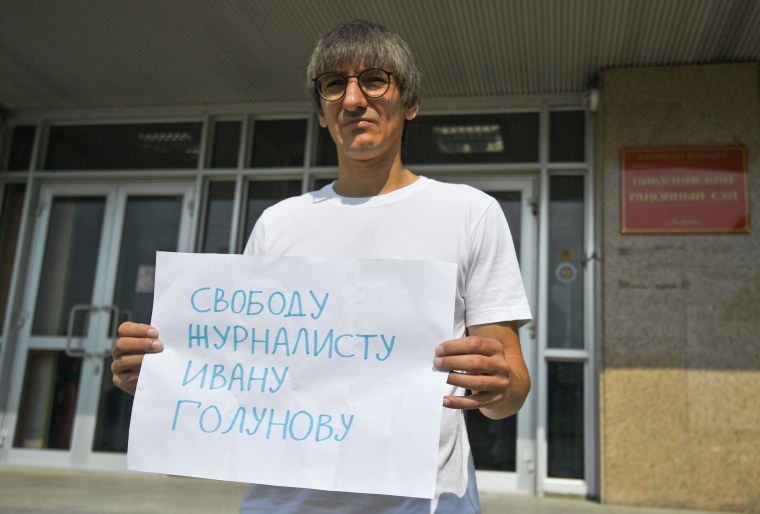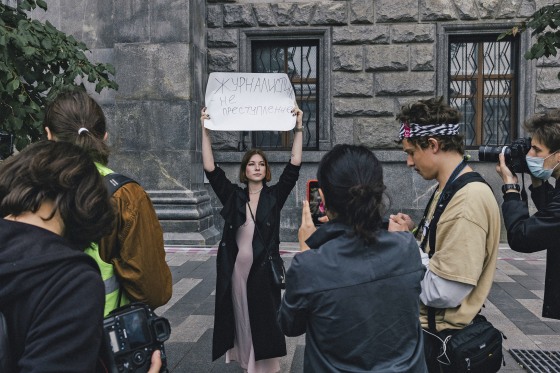KRAKOW, Poland — Being an independent journalist in Russia has never been for the faint of heart, especially with government pressure growing year by year since the fall of the Soviet state. But a crackdown in the days following Russia’s invasion of Ukraine has made the situation increasingly untenable and forced many to flee.
Those who made up a small but dogged band of reporters determined to uncover and tell the truth in Russia are now scattered across Europe, uncertain of their futures and fearful for their country’s.
It is now a crime in Russia punishable by 15 years in prison to spread “false information” about the war, which can’t even be called a war without fear of punishment.
As a result, at least 150 journalists have fled the country since the war started nearly three weeks ago, according to the Russian investigative news site Agentstvo, which is based in Georgia.
“Every journalist in Russia who is trying to say the truth about what’s happening could be put in jail,” said Katya Arenina, a reporter at Agentstvo.
They have largely headed to Turkey, Armenia, Serbia and Georgia, she said — countries that haven’t closed their airspace to Russian flights or where Russians don’t need visas.
Ksenia Mironova, 23, was juggling her job as a journalist with the demands of preparing to adopt a child. Weeks later she has left her home in Moscow, fearing she might also face prison if she stayed.
Mironova worked for TV Rain, for years a rare source of independent news in the country. Russian President Vladimir Putin’s crackdown has forced the channel off the air, along with any other likely source of critical coverage.

Mironova, who asked that her current location not be mentioned out of fear of reprisal, said she and her colleagues first decided to leave their Moscow newsroom when they found out police would be coming to their offices after they blocked access to the channel’s website.
She packed up her stuff, headed to the airport with colleagues and left the country she had hoped might see a different future.
The next day TV Rain announced that it would suspend operations, while the independent radio station Echo of Moscow decided to shut down after access to its site was also blocked.
The Kremlin has driven out the last remaining bastions of independent and international news media while restricting access to social media sites that might also offer a counter to the official narrative of a limited military operation intended merely to “de-nazify” Ukraine.
Journalists are getting out before they face a visit from Putin’s security services; Russians who remain have little news beyond state media.
Mironova has left behind her fiancé, a former journalist who was imprisoned in 2020 on charges of treason and remains behind bars. She said she didn’t want either of their families to have to take on expenses like sending food if she were also jailed.
“They have no money for two people in prison,” Mironova said.
TV Rain anchor Mikhail Fishman, 49, said he was blocked from entering Georgia at the country’s Tbilisi international airport. He believes it was because of concerns that his presence as a critical journalist would worsen the country’s relations with the Kremlin.
In response to a request for comment, Georgia’s Internal Affairs Ministry referred NBC News to past comments in which Minister Vakhtang Gomelauri said Fishman was one of more than 100 foreign citizens to fall foul of tightened border control policies from law enforcement agencies.
Fishman, who has left Russia and also withheld his current location over fears of reprisal, said he had promised himself he would stay in Russia as long as the independent channel was still on the air.
He said the new law that sets out prison terms for anyone going against the government’s messaging about the war made him especially concerned.
“It was clear that we, TV Rain [and] independent journalists as a whole, are now treated as enemies of the state,” he said. “Who knows what would be the next step?”

Mironova and Fishman said Putin had long been able to convince Russians that he would provide stability and prosperity in contrast to the low living standards they faced in the 1990s, after the collapse of the Soviet Union.
The economy has grown during his two decades in power, although it has been allied with growing limits on press freedom and the right to protest. Putin has accumulated political power and sought to silence voices that might pose a threat.
Now Western sanctions in response to the invasion are crippling Russia’s economy, but journalists who fled have little hope it might loosen his grip on power.
“His propaganda is really good,” said Dima Barchenkov, 23, a culture journalist and filmmaker who fled to Istanbul on an overnight flight this month over fears that he would be punished for his work.
Barchenkov stressed that he did not want to leave his country but felt compelled to because of the increasing power of the state.
“The knots are being tightened,” he said.
His biggest concern now is his future, with no idea what he will do in a foreign country, while he fears Russian culture and talent might not be accepted in the West.
All of the journalists said they were afraid Putin would go much further to limit the media. The possibilities are as varied as stopping access to YouTube to shutting down the internet altogether.
However, they also had hope that Russians will find ways to maintain access to independent information, although they said they don’t know how that would happen.
Barchenkov said journalists living in exile could come together and find a way to cover what is happening in Russia.
Mironova shared the same hope but said her days are filled trying to figure out how to send letters to her imprisoned fiancé and money home to her family, because her credit cards aren’t working.
She said she can’t plan much of a future beyond that, except for hoping she might one day be able to return home.
“This is my country,” she said. “I always wanted to live in Russia, to have a family in Russia.”
